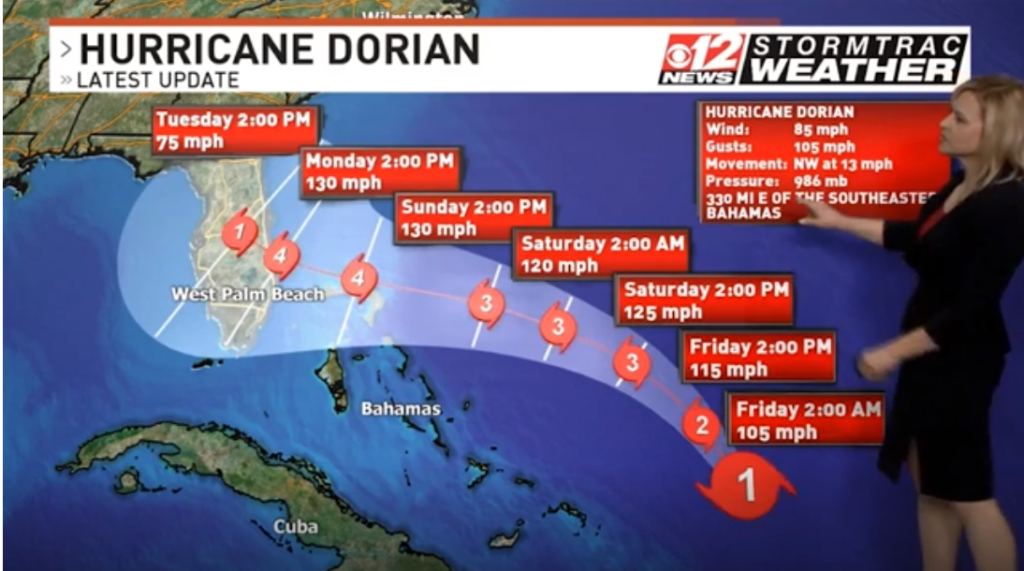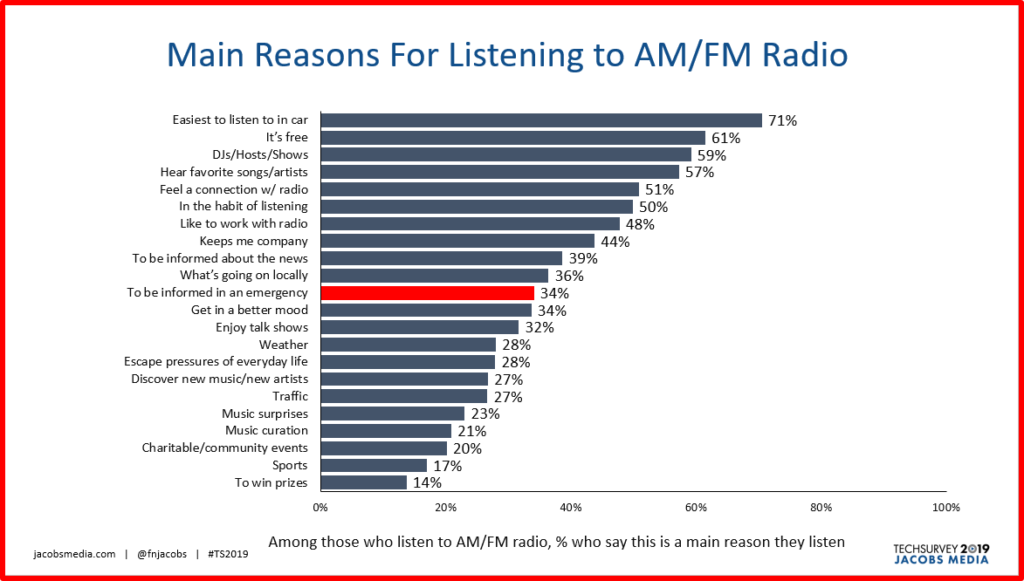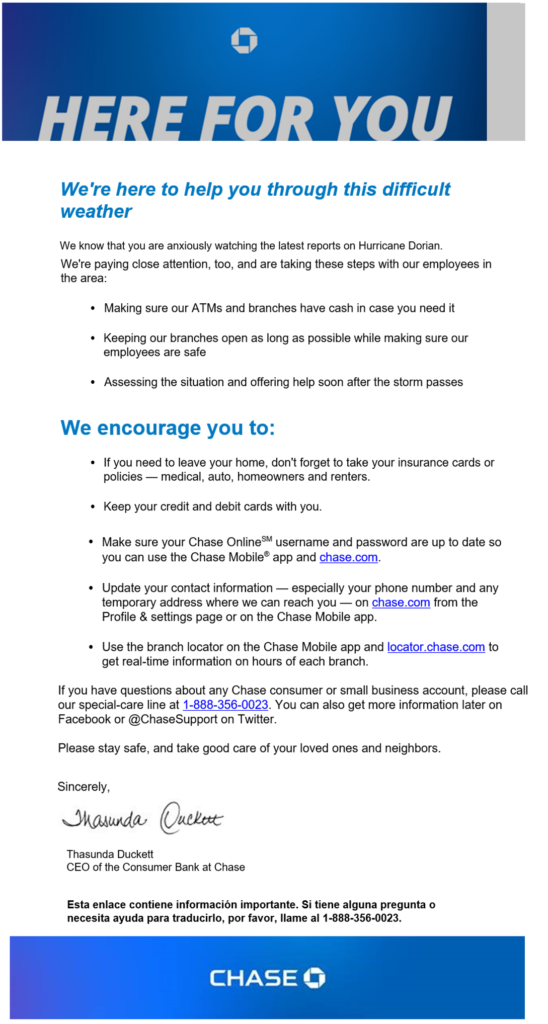
One of the most challenging aspects for local media outlets covering emergencies is that we usually don’t see them coming. Tornadoes, school shootings, rock star deaths – rarely do we have much notice that impending disaster is upon us.
Until it strikes.
And as we’ve discussed so often in this space, these emergencies also have a nasty habit of occurring at night, or worse, over the weekends where radio station buildings are either lightly staffed or the whole place is on auto pilot.
But in the case of hurricanes, we have advance notice – often days ahead. That’s the case with Hurricane Dorian. It’s been forming for days now, and meteorologists all over the world are tracking it. Dorian has already blown through the Virgin Islands and Puerto Rico. And now it’s headed right for the east coast of Florida. We even have a pretty good idea when it will hit, even if we don’t know with any certainty precisely where it will wreak the most havoc.
This gives media brands – particularly, radio stations – a chance to prepare. If there’s a news station in your building, it might become the center of the cluster’s coverage. Perhaps your station or group already has an arrangement in place to simulcast or co-broadcast with a local TV station. We always recommend that every radio outlet has an emergency plan in place for potential catastrophes like this one.
Whatever the case may be, an impending disaster like Dorian is a chance for radio to do what it (should) do best – provide emergency local coverage and serve its communities.
It matters. In Techsurvey 2019, we asked respondents to tell us why they enjoy listening to broadcast radio. You may have seen the chart below, showing the main reasons why consumers love radio. Usually, we focus on music, personalities, and those “emotional benefits,” such as companionship or mood elevation.
But as the chart shows, emergency coverage is one of those buttons that matters to listeners – especially when they’re literally looking into the eye of a hurricane.

Just over a third of respondents tell us that being informed in the event of an emergency is a key reason why people turn to AM/FM radio. I have a feeling if we surveyed Floridians this afternoon, that percentage would be on the rise.
And while no one wants to exploit a local disaster, the fact is many radio stations do provide solid coverage during emergencies, often winning them recognition, respect, and even Marconi Awards. In fact, I’ve sat through enough of those NAB dinners to know that above-and-beyond coverage during emergencies often wins broadcasters those coveted glass trophies.
Of course, recognition is not why the hard working, dedicated men and women in radio will do their best this weekend. They do it because that what you do when these disasters are upon us.
Yet, most radio stations don’t get out in front of these situations, even on a day like today when every broadcaster in Florida (and Georgia and other coastal communities) knows precisely what may happen over this Labor Day weekend.
Like Chase Bank did.
That’s right – a multi-national financial institution with more than 250,000 employees in 100 countries with assets of $2.49 trillion (as of 2016) took the time to send Lori Lewis the email you see below.
Chase is bigger than every U.S. radio company combined, but somehow, Thasunda Duckett, Chase’s CEO of the Consumer Bank, took the time to assure a valued customer the bank has her covered.

As you can see in this missive, Thasunda even reminds Lori how to prepare in the event she has to evacuate her home. Not only is it a small piece of reassurance in an otherwise scary situation, but it’s what you’d hope your bank – or your radio station might do.
Reminding listeners of how your station intends to handle coverage, the importance of having a battery operated radio (and having plenty of batteries), and providing the direct line into the studio(s) to report up-to-the-minute news and information is all part of the communications strategy stations in Dorian’s path should be executing.
It’s not just about having a disaster plan – it’s about having a communications strategy.
Of course, Chase doesn’t have a microphone, a transmitter, or a tower – so, it’s all about email. These same radio stations in Dorian’s path could also use this same messaging on the air all weekend long, reassuring their audiences and making their commitments to stay on the air as long as possible to serve their communities.
I wouldn’t count on Pandora, SiriusXM, Spotify, or Wondery providing this type of service during a critical moment in people’s lives.
That’s why they listen to radio – their media port in the storm.
Good luck to all of our friends, family, and colleagues in Florida this weekend.
- What To Do If Your Radio Station Goes Through A Midlife Crisis - April 25, 2025
- A 2020 Lesson?It Could All Be Gone In A Flash - April 24, 2025
- How AI Can Give Radio Personalities More…PERSONALITY - April 23, 2025




Community has properties in both SC and FL and has been through this numerous times in the several years we’ve been in the south. We have solid plans to remain live and local in both markets. Our managers and wonderful teams are committed to sleeping on air mattresses, drink our water and eat our snacks when they contact political, military and first responder leaders to provide updated news and information while discarding most of our usual formattics. It is our duty to serve “the public interest, convenience and necessity.” We take our mandate seriously.
Good to hear, Jim and Bruce. Let your audience know, and good luck to your team and their families.
Yes !
My issue is that in a majority of these cases, I’ve seen radio stations simply simulcast local TV stations’ audio, rather than serve as an information source of their own. Local clusters have been stripped of resources to the point where they’re forced to rely on other media companies’ feed — but claim they’re necessary when the region experiences dire circumstances because they deliver information… that isn’t even their own. Simply serving as another content-delivery mechanism for your local Eyewitness News team doesn’t make you a valued and needed outlet, it just makes you a convenient transmitter.
Keith, I agree on one level. But any port in the storm (no pun intended). More people probably have battery operated radios so at least carrying some form of local coverage is better than nothing. Most radio stations sadly don’t have the resources to do a whole lot in these situations, particularly in smaller markets. A partnership with a bigger media outlet isn’t ideal, but at least it’s something. Thanks for chiming in.
Listening to ZNS 1540 at Freeport Grand Bahama. Currently simulcasting with their TV station. Interesting to listen and learn on how they are covering the story unfolding with very few technical resources.
All the more impressive. Thanks for that insight, Mike.